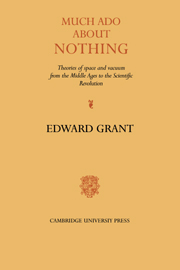 Much Ado about Nothing
Much Ado about Nothing Published online by Cambridge University Press: 07 October 2011
JOHN MAJOR AS A POSSIBLE LINK BETWEEN MEDIEVAL AND EARLY MODERN SCHOLASTICS
Although we have now seen that numerous late medieval authors had occasion to express an opinion on extracosmic void, few considered it within the theological context developed in the last chapter. This situation changed dramatically during the sixteenth century, when the relationship of God and a possible infinite void space came to be discussed at great length by numerous scholastic authors of major and minor significance. That the problem was a legacy of the late Middle Ages can scarcely be doubted. And yet the names of Bradwardine, De Ripa, and Oresme, who accepted the possibility or actuality of an infinite void space associated with God's immensity, go unmentioned in the great debates that developed in the sixteenth and seventeenth centuries. Despite the publication of Bradwardine's De causa Dei by Henry Savile in 1618, it played no apparent role in the sixteenth century, and no citation of it in the seventeenth has yet come to light. But the ideas that Bradwardine, De Ripa, and Oresme expressed are much in evidence and may plausibly be assumed to form the ultimate basis for the elaborate and detailed discussions of the later period. But by whom were their ideas transmitted?
To save this book to your Kindle, first ensure no-reply@cambridge.org is added to your Approved Personal Document E-mail List under your Personal Document Settings on the Manage Your Content and Devices page of your Amazon account. Then enter the ‘name’ part of your Kindle email address below. Find out more about saving to your Kindle.
Note you can select to save to either the @free.kindle.com or @kindle.com variations. ‘@free.kindle.com’ emails are free but can only be saved to your device when it is connected to wi-fi. ‘@kindle.com’ emails can be delivered even when you are not connected to wi-fi, but note that service fees apply.
Find out more about the Kindle Personal Document Service.
To save content items to your account, please confirm that you agree to abide by our usage policies. If this is the first time you use this feature, you will be asked to authorise Cambridge Core to connect with your account. Find out more about saving content to Dropbox.
To save content items to your account, please confirm that you agree to abide by our usage policies. If this is the first time you use this feature, you will be asked to authorise Cambridge Core to connect with your account. Find out more about saving content to Google Drive.